
Journal Menu
► ▼ Journal Menu-
- Sustainability Home
- Aims & Scope
- Editorial Board
- Reviewer Board
- Topical Advisory Panel
- Instructions for Authors
- Special Issues
- Topics
- Sections & Collections
- Article Processing Charge
- Indexing & Archiving
- Editor’s Choice Articles
- Most Cited & Viewed
- Journal Statistics
- Journal History
- Journal Awards
- Society Collaborations
- Conferences
- Editorial Office
Journal Browser
► ▼ Journal BrowserNeed Help?
Announcements
22 April 2025
International Mother Earth Day, 22 April 2025
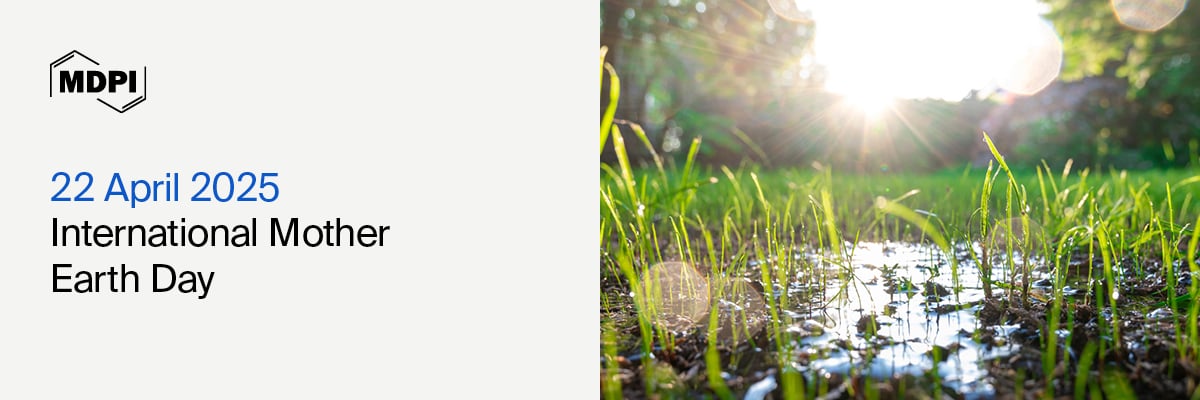
Mother Earth is sending us an urgent call to action as nature suffers from the devastating impacts of human activity. Our oceans are choked with plastic and acidifying, while extreme heat, wildfires, and floods have disrupted millions of lives. Climate change, deforestation, unsustainable agriculture, illegal wildlife trade, and other human-driven disruptions are accelerating the destruction of ecosystems and biodiversity. As we mark the third Mother Earth Day within the UN Decade on Ecosystem Restoration, it is clear that healthy ecosystems are vital for all life on Earth. Restoring damaged ecosystems can help end poverty, fight climate change, and prevent mass extinction, but success depends on everyone playing their part. Together, we must act now to heal our planet and secure a sustainable future for generations to come.
On this significant day, we are proud to present a curated collection of articles and initiatives dedicated to groundbreaking research and innovative solutions for protecting and restoring our planet. As we celebrate Mother Earth and reflect on the urgent need for action, these contributions highlight critical efforts to combat climate change, restore ecosystems, and promote sustainability. We invite readers to explore these resources and join us in our shared mission to safeguard the health of our planet for future generations. Together, we can make a lasting impact and ensure a thriving, resilient Earth for all.

|
Environmental & Earth Sciences |
Biology & Life Sciences |

Keynote Speakers
|
|
|
|
Prof. Károly Németh Institute of Earth Physics and Space Science, New Zealand |
Prof. Brendan Macke Griffith University, Australia |

“The Conservation of Biodiverse and Threatened Dry Rainforest Plant Communities Is Vital in a Changing Climate”
by Marion Howard, Hilary Pearl, Bill McDonald, Yoko Shimizu, Sanjeev Kumar Srivastava and Alison Shapcott
Conservation 2024, 4(4), 657-684; https://doi.org/10.3390/conservation4040040
“Ten Years of Mediterranean Monk Seal Stranding Records in Greece under the Microscope: What Do the Data Suggest?”
by Maria Solanou, Aliki Panou, Irida Maina, Stefanos Kavadas and Marianna Giannoulaki
Animals 2024, 14(9), 1309; https://doi.org/10.3390/ani14091309
“Groundwater Temperature Stripes: A Simple Method to Communicate Groundwater Temperature Variations Due to Climate Change”
by Manuela Lasagna, Elena Egidio and Domenico Antonio De Luca
Water 2024, 16(5), 717; https://doi.org/10.3390/w16050717
“Resilience of an Urban Coastal Ecosystem in the Caribbean: A Remote Sensing Approach in Western Puerto Rico”
by Yadiel Noel Bonilla-Roman and Salvador Francisco Acuña-Guzman
Earth 2024, 5(1), 72-89; https://doi.org/10.3390/earth5010004
“Particulate Matter in the American Southwest: Detection and Analysis of Dust Storms Using Surface Measurements and Ground-Based LIDAR”
by Joscelyne Guzman-Gonzalez, Rosa M. Fitzgerald, Nakul N. Karle, Ricardo K. Sakai and William R. Stockwell
Atmosphere 2024, 15(1), 110; https://doi.org/10.3390/atmos15010110
“An Imported Environmental Crisis: Plastic Mismanagement in Africa”
by Gilbert Moyen Massa and Vasiliki-Maria Archodoulaki
Sustainability 2024, 16(2), 672; https://doi.org/10.3390/su16020672
“The Effect of Habitat on Insect Movements: Experimental Evidence from Wild-Caught Butterflies”
by Matteo Marcantonio, Raluca Voda, Daniele Da Re, Quentin Igot, Roger L. H. Dennis, Aurélien Vielfaure, Sophie O. Vanwambeke and Caroline M. Nieberding
Insects 2023, 14(9), 737; https://doi.org/10.3390/insects14090737
“Artificial Reefs around the World: A Review of the State of the Art and a Meta-Analysis of Its Effectiveness for the Restoration of Marine Ecosystems”
by Carolina Bracho-Villavicencio, Helena Matthews-Cascon and Sergio Rossi
Environments 2023, 10(7), 121; https://doi.org/10.3390/environments10070121
“Topography, Slope and Geomorphology’s Influences on Shoreline Dynamics along Dakar’s Southern Coast, Senegal”
by Ibrahima Pouye, Dieudonné Pessièzoum Adjoussi, Jacques André Ndione and Amadou Sall
Coasts 2023, 3(1), 93-112; https://doi.org/10.3390/coasts3010006
“Potential Use of Industrial Biomass Waste as a Sustainable Energy Source in the Future”
by Tomasz Kalak
Energies 2023, 16(4), 1783; https://doi.org/10.3390/en16041783

|
“Nature-Based Solutions to Extreme Wildfires” Guest Editor: Adrián Regos Submission deadline: 15 June 2025 |
“Impact of Environmental Factors and Management Practices on Bee Health - 2nd Edition” Guest Editors: Ivana Tlak Gajger and Franco Mutinelli |
|
|
|
18 April 2025
Meet Us at the 19th International Conference on Chemistry and the Environment (ICCE 2025), 8–12 June 2025, Belgrade, Serbia

Conference: The 19th International Conference on Chemistry and the Environment (ICCE 2025)
Date: 8–12 June 2025
Location: Belgrade, Serbia
MDPI will be attending the 19th International Conference on Chemistry and the Environment as an exhibitor. We welcome researchers from different backgrounds to visit and share their latest ideas with us.
Continual knowledge development is essential to ensure a healthy environment and the safe progress of society. ICCE 2025 aims to accelerate this process by addressing a wide range of challenges and developments from the perspective of environmental chemistry, serving societal sustainability goals.
ICCE 2025 will provide an excellent platform for networking, exchange, and collaboration. It offers a unique opportunity to share and discuss research not only within the research community but also with industry professionals and competent authorities.
The following MDPI journals will be presented at the conference:
If you plan to attend the above conference, please do not hesitate to start a conversation with us. Our delegates look forward to meeting you in person and answering any questions you may have.
For more information about the conference, please visit the following website: https://icce2025.com/.
18 April 2025
Meet Us at the 33rd European Biomass Conference and Exhibition (EUBCE 2025), 9–12 June 2025, Valencia, Spain

Conference: The 33rd European Biomass Conference and Exhibition (EUBCE 2025)
Date: 9–12 June 2025
Location: Valencia, Spain
MDPI will be attending the 33rd European Biomass Conference and Exhibition (EUBCE 2025) as an exhibitor. We welcome researchers from different backgrounds to visit and share their latest ideas with us.
The EUBCE is the largest biomass conference and exhibition in the world. Each year, the EUBCE brings together the greatest minds and the latest advancements in biomass studies, with the aim of accelerating research and market uptake across the globe. During the conference, over 2,000 experts from both academia and industry share and discuss groundbreaking ideas, technologies, applications, and solutions for the sourcing, production, and utility of biomass. This scientific program is coordinated by the Joint Research Centre of the European Commission. Since its 30th edition, the event has been complemented by the Circular Bio-Based Europe Joint Undertaking, aiming at identifying innovation, stimulating investment, and mobilizing the bio-based industrial sector. This is an excellent opportunity to address even more global stakeholders during the conference.
The following MDPI journals will be represented at the conference:
- Sustainability;
- Resources;
- Recycling;
- Environments;
- Earth;
- Clean Technologies;
- C;
- Waste;
- Fuels;
- Biomass.
If you are planning to attend the above conference, please do not hesitate to contact us. Our delegates look forward to meeting you in person and answering any questions that you may have.
For more information about the conference, please visit the following website: https://www.eubce.com/.
18 April 2025
Meet Us at the 5th International Conference on Urban Climate and Urban Design, 30 May–1 June 2025, Chongqing, China
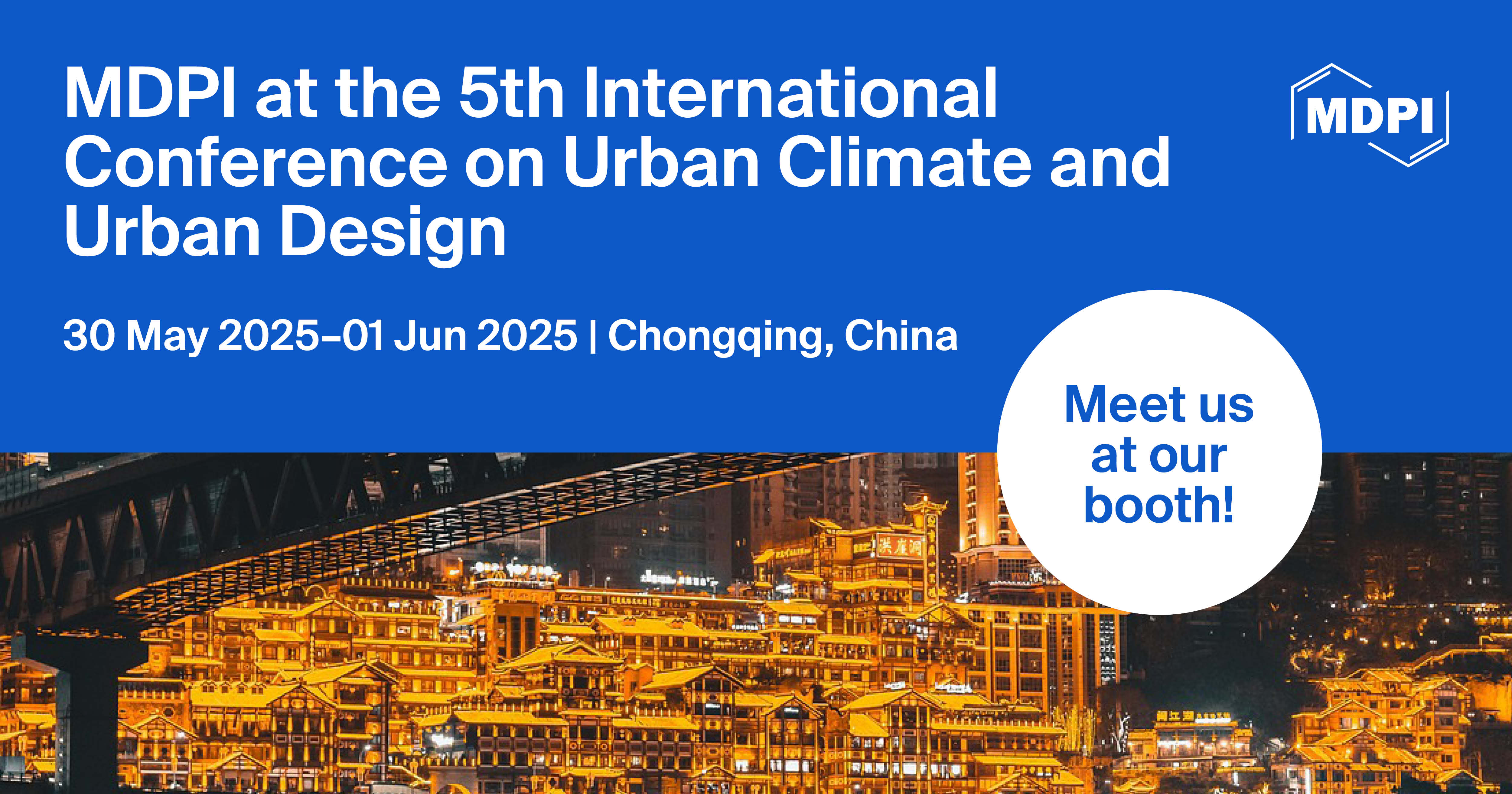
Conference: The 5th International Conference on Urban Climate and Urban Design
Date: 30 May–1 June 2025
Location: Chongqing, China
MDPI will be attending the 5th International Conference on Urban Climate and Urban Design as an exhibitor. We welcome researchers from different backgrounds to visit and share their latest ideas with us.
Climate change is one of the great challenges of the century facing mankind. Building climate-resilient cities, minimizing the adverse impacts and risks of climate change, and improving cities’ ability to adapt to climate change are of great significance for ensuring the safe operation of cities, enhancing their competitiveness and sustainable development potential. This international conference aims to discuss how to create a climate-resilient human settlement environment for effective mitigation and adaptation from the aspects of urban climate issues, urban climate adaptation design, development positioning and the advantages of different disciplines, interdisciplinary integration and academic exchange, and the formulation of climate adaptation guidelines and standards, thus allowing us to form a path and model for building climate-resilient cities.
The following MDPI journals will be represented at the conference:
If you are planning to attend the above conference, please do not hesitate to start a conversation with us. Our delegates look forward to meeting you in person and answering any questions that you may have.
For more information about the conference, please visit the following webpage: https://mp.weixin.qq.com/s/9_JJufWHnvxXZ-nasyKwww.
18 April 2025
Empowering Academic Growth with MDPI: A Scientific Publishing Exchange with Texas A&M University—Kingsville, 28 April 2025
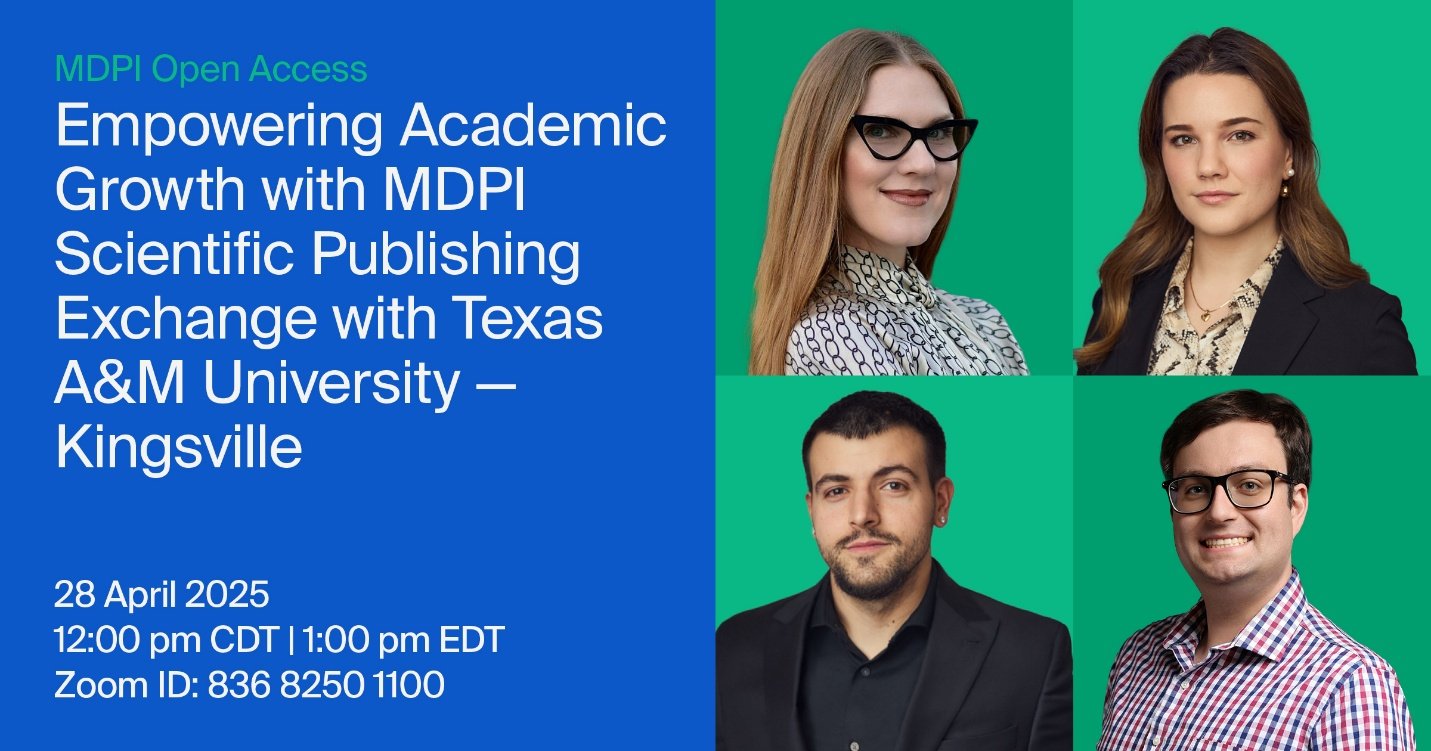
MDPI is proud to partner with Texas A&M University–Kingsville to host an exclusive Online Scientific Publishing Exchange, designed to support researchers at every stage of their academic careers. This insightful event will feature experienced professionals from the publishing world, offering expert guidance on the evolving landscape of scientific research and publication.
The event will spotlight MDPI’s leading journal, Sustainability (ISSN: 2071-1050), providing attendees with a deeper understanding of its scope, submission process, and opportunities for publication.
Workshop Highlights:
- Introduction to MDPI and the Sustainability Journal;
- The Role of AI in Scientific Publishing;
- How to Effectively Respond to Peer Reviewers;
- Scientific Writing Essentials.
Date: 28 April 2025
Time: 1:00–3:00 p.m. EDT
Journal Involved: Sustainability
Website: https://sciforum.net/event/AT-9
Schedule:
| Speaker | Program | Time in EDT |
| Ms. Jelena Milenkovic | Introduction to Open Access and Sustainability Journal | 1:00–1:20 p.m. |
| Dr. Stephen Mora | The Role of AI in Scientific Publishing | 1:20–1:50 p.m. |
| Ms. Sofia Zelko | How to Respond to Peer Reviewers | 1:50–2:20 p.m. |
| Dr. Zach Churcher | How to Write Scientific Papers/Closing of Session | 2:20–2:50 p.m. |
| Q&A Session | 2:50–3:00 p.m. |
MDPI Speakers:
 |
Ms. Jelena Milenkovic is a Ph.D. candidate in geosciences at the Faculty of Geography, University of Belgrade. She joined MDPI in January 2022 as an Assistant Editor and gradually took on additional roles and responsibilities, such as managing Special Issues. Currently, she works as a Journal Relations Specialist for the Sustainability journal. |
 |
Dr. Stephen Mora has an M.Sc. and Ph.D. in kinesiology and health science from York University. He started at MDPI in May 2024 and is now the Managing Editor of the IJOM, a newly transferred society journal of MDPI. During his graduate studies and MDPI tenure, Stephen has gained extensive experience in attending conferences, meeting with scholars, and hosting online and in-person presentations. |
 |
Ms. Sofia Zelko graduated from Carleton University with a B.Sc. in combined honors in neuroscience and biology, along with a minor in German, and followed that with an MSc. in pharmaceutical sciences from the University of Toronto. Motivated by her passion for science and communication, Sofia is a Journal Relations Specialist at MDPI, helping to connect authors and scholars to greater publishing opportunities. |
 |
Dr. Zach Churcher has a B.Sc. in pharmaceutical chemistry from the University of Toronto and a Ph.D. in chemistry at York University. He joined MDPI as an Assistant Editor for the Sensors journal at the Toronto Office and is now a regional Journal Relations Specialist for North America, traveling across Canada and the United States, attending conferences, and meeting with scholars. |
17 April 2025
MDPI Webinar | International Mother Earth Day, 22 April 2025
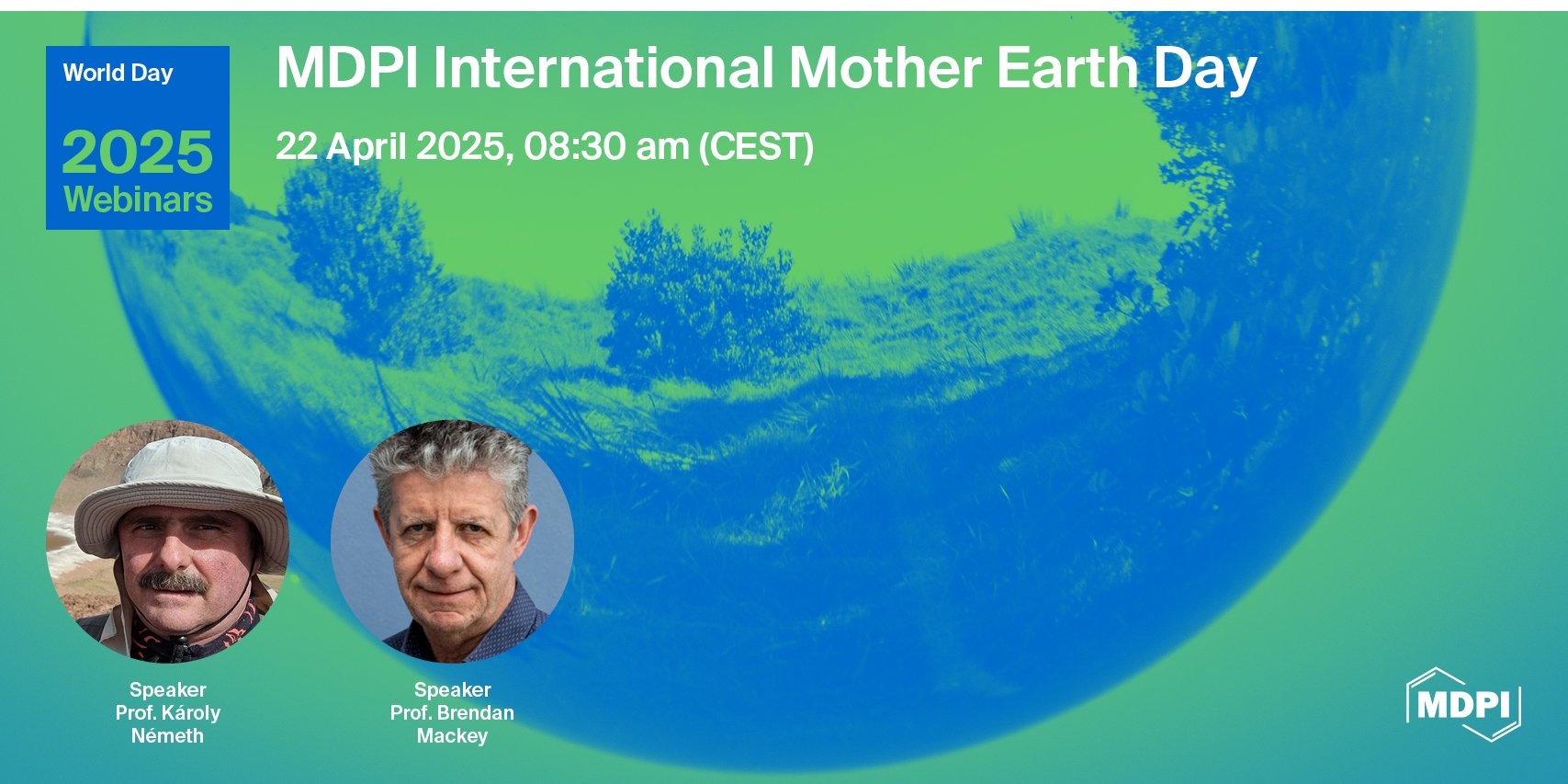
In commemoration of International Mother Earth Day, MDPI is organizing a special webinar to bring together researchers and experts to share their thoughts on raising awareness about the importance of environmental protection and addressing pressing global issues such as climate change, ecosystem recovery, and sustainable development.
The theme of the webinar revolves around fostering a deeper understanding of humanity’s role in preserving our planet for future generations, as well as the crucial roles of biodiversity conservation and sustainable practices in preserving our ecosystems for future generations. This webinar will provide a platform for meaningful discussions and knowledge exchange on the importance of climate change and the importance of the recovery of our ecosystems.
We are looking forward to seeing you at the MDPI International Mother Earth Day Webinar 2025. Please find an up-to-date outline of the presenters below.
Any interesting suggestions regarding topics and speakers are welcome.
Date: 22 April 2025
Time: 8:30 a.m. CEST | 4:30 p.m. AEST | 2:30 p.m. CST Asia
Webinar ID: 878 0932 6864
After registering, you will receive a confirmation email with information on how to join the webinar. Registrations with academic institutional email addresses will be prioritized.
Unable to attend? Register anyway and we will inform you when the recording is available to watch.
Register now for free!
Program:
|
Time (CEST) |
Program and Conten |
|
8:30–8:35 a.m. |
Opening Ceremony |
|
8:35–9:05 a.m. |
Geoheritage as the Building Block of the Geodiversity of Earth Heritage |
|
9:05–9:35 a.m. |
A Science Perspective on Ethics, Multi-Species Kinship, and Duty of Care to Future Generations |
|
9:35–9:55 a.m. |
Q&A Session |
|
9:55–10:00 a.m. |
Closing of Program |
Webinar Speakers:
- Prof. Károly Németh, 1 National Program of Earthquakes and Volcanoes, Saudi Geological Survey, Jeddah, Saudi Arabia; 2 Institute of Earth Physics and Space Science, Sopron, Hungary; 3 Geoconservation Trust Aotearoa SW Pacific, Opotiki, New Zealand;
- Prof. Brendan Macke, Griffith University, Queensland, Australia.
For more information about this webinar, please visit https://sciforum.net/event/MEDW2025?subscribe.
If you have any questions about this webinar, please contact journal.webinar@mdpi.com.
MDPI International Mother Earth Day Webinar Secretariat
15 April 2025
Sustainability | Interview with Prof. Idiano D’Adamo—Section Editor-in-Chief of the “Development Goals towards Sustainability” Section
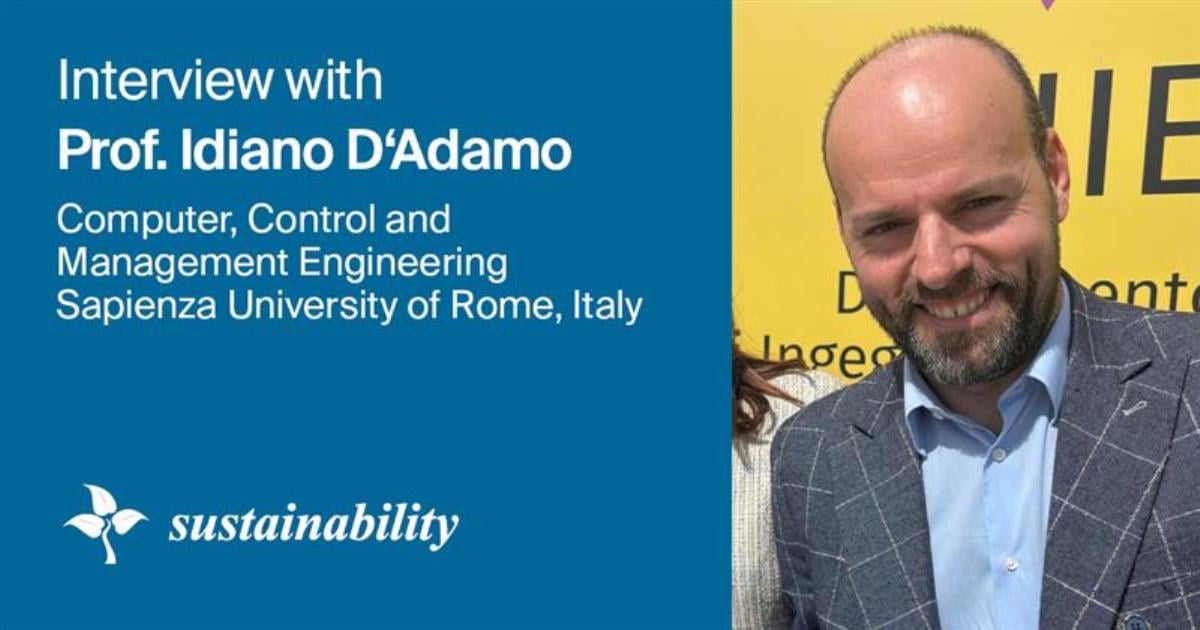
Name: Prof. Idiano D’Adamo
Affiliation: Department of Computer, Control and Management Engineering Sapienza University of Rome, Via Ariosto 25, 00185 Rome, Italy
Research interests: bioeconomy; biomethane; circular economy; e-waste; economic analysis; photovoltaic; renewable energy; sustainability; waste management
The following is a short interview with Prof. Idiano D’Adamo:
1. What developments in your field of expertise excite you currently?The Sustainable Development Goals (SDGs) play a fundamental role in guiding global development towards a more inclusive, equitable, and environmentally sustainable future. Adopted by all United Nations Member States in 2015, the 17 SDGs offer a common framework for tackling the world's main challenges, ranging from poverty and hunger to climate change and inequality.
Sustainability is not just an interest, but a conscious and passionate choice. The answer to this vision is that a purely ideological approach, separated from concrete reality, does not allow us to improve our current situation, hence the need to adopt a pragmatic approach. In this way, what is born from thought must be put to the test of experience, trying to identify not only an abstract model but also a concrete solution. Theories and words are not enough; real actions and facts are necessary.
Pragmatic sustainability is a model that considers the three fundamental dimensions—environmental, economic, and social—and does not limit itself to theorizing a concept, but ensures that it is effectively applied in practice, concretizing itself through analyses that support its validity. Pragmatic sustainability is based on the concept of altruism, just like the morning sentinels celebrated by San Giovanni Paolo II, who defended “life at every moment of its earthly development” to make it “increasingly habitable for all”.
The idea is to maintain the rigor of this Section where the reject rate is high because when critical issues are highlighted, the utmost attention must be paid. The success of these 2 years derives from the synergy between all the members of the editorial team as it is necessary to work in a climate of harmony. This Section has the characteristic that a clear reference to the SDGs must be made within the manuscript. This objective is like the lighthouse that guides a ship in a storm. Publication times depend on many aspects, but it is always advisable to have at least two complete reviews. Long publication times risk losing the novelty of the work. Similarly, editors cannot keep scientific papers parked in their emails. Science must be respected, regardless of one's role. This Section will be able to continue without me because we must leave behind a method that the younger generation will be able to continue and probably do even better than us. The future goal of this Section is to preserve its quality.
3. As the Section Editor-in-Chief, what do you find to be the most important parameter for the success of the Section?Scopus recently proposed indications on authors in relation to the SDGs. This aspect must become a greater part of everyday life. This Section bases its strategy on always emphasizing the idea that scientific works that talk about sustainability should identify specifically which SDG they can achieve.
Sustainability is not a simple challenge; it requires big changes. The strength of this Section is the heart of those who work there and try to convey their passion for the topic of sustainability. We are a big family thanks to the excellent EBMs, managing editors, and assistant editors who work together in synergy. The concept of a sustainable community brings together the various stakeholders.
It is a great opportunity but also a potential risk. Its main advantage is that it allows everyone to read scientific works, especially young people, giving them the pleasant feeling of reading a work and who knows, maybe one day becoming a scientific author. Its main disadvantage is that there is a risk of giving too much importance to the economic aspects and it could prevent developing countries, as well as young researchers, from having the funds to be able to publish. The challenge of finding a balance must be sought in light of the dynamism that characterizes the scientific publishing market.
5. What advice would you offer to young researchers?An article should be written because you are passionate about it, not because you need to advance your career. An article requires your name because you worked on this research, sometimes you even give up your free time because you hope that your results can be of help to others. Do not listen to those who want to teach you how to write articles, but then you never see them working on articles! Try to learn, try to find time with colleagues you respect, and, where you can, create a healthy network in order to acquire new skills. When you feel your passion waning, stop and experience nature. Sea or mountain, the important thing is to breathe clean air, help people in need, and respect the great gift of life.
14 April 2025
Meet Us at the 5th Materials Research Society of Thailand International Conference in Conjunction with the 1st ECS Thailand Meeting, 14–16 May 2025, Bangkok, Thailand
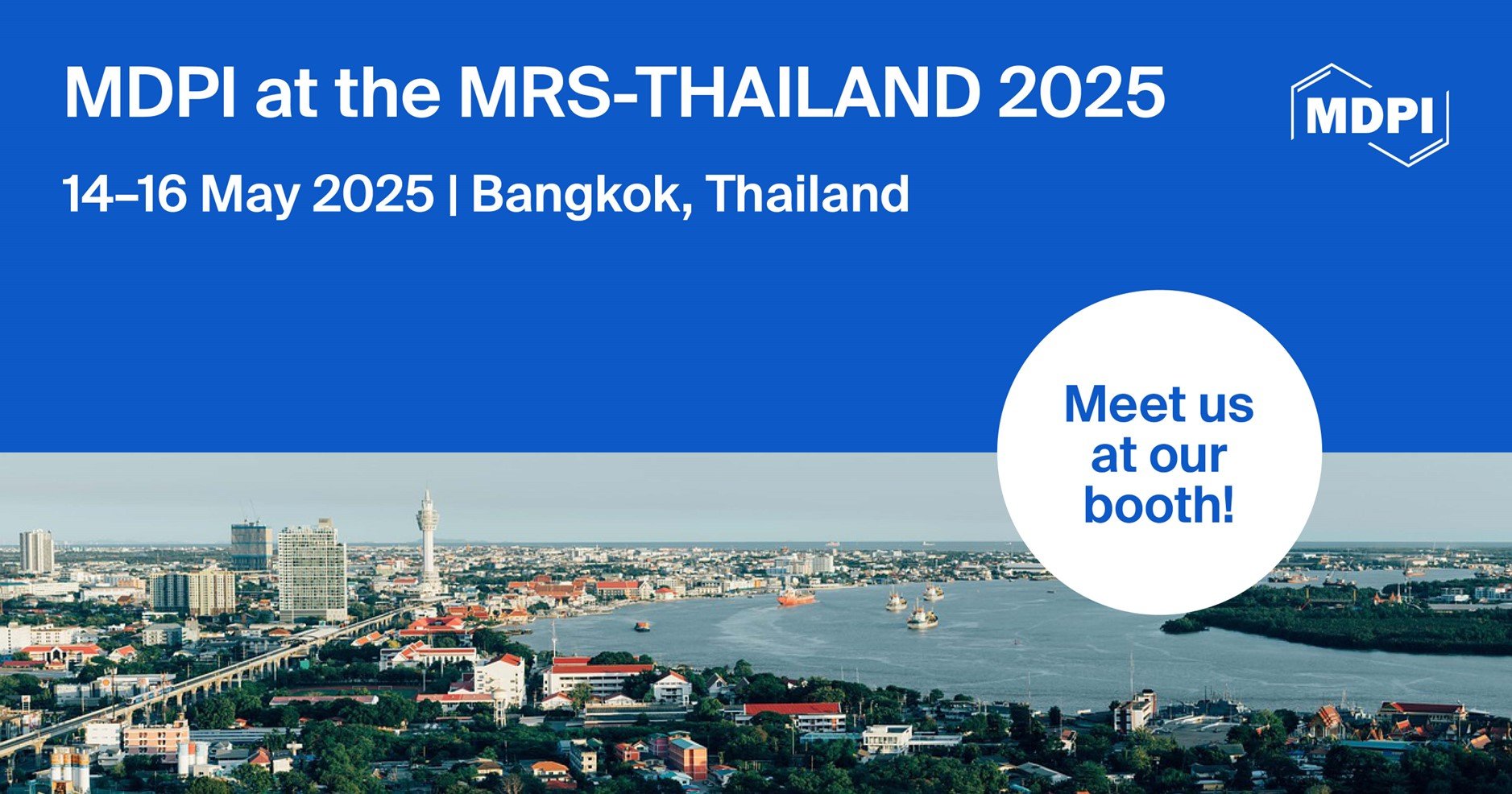
Conference: The 5th Materials Research Society of Thailand International Conference (in conjunction with the 1st ECS Thailand Meeting)
Organization: The Materials Research Society of Thailand (MRS-Thailand) and the Institute of Science, Suranaree University of Technology (SUT)
Date: 14–16 May 2025
Place: The Berkeley Hotel Pratunam, Bangkok, Thailand
MDPI journals will be attending the 5th Materials Research Society of Thailand International Conference in conjunction with the 1st ECS Thailand Meeting, as exhibitors. This event will be held at the Berkeley Hotel Pratunam, Bangkok, Thailand, from 14 to 16 May 2025.
MRS-Thailand 2025 celebrates the 35th anniversary of Thailand’s first regional university, where “technology is at the heart of what we do”. This year’s theme, “Innovations in Materials Science for Sustainable Development”, reflects the university’s commitment to advancing knowledge and fostering collaboration in the field.
MRS-Thailand is a prestigious international conference series organized by the Materials Research Society of Thailand (MRS-Thailand). Since its inception in 2017, MRS-Thailand has grown into a significant platform for researchers, scientists, engineers, and industry professionals to exchange insights, share innovative ideas, and foster collaborations in the field of materials science and engineering.
The following MDPI journal will be represented:
If you plan to attend this conference, please feel free to visit our booth. Our delegates look forward to meeting you in person and answering any questions that you may have.
14 April 2025
MDPI Open Science Insights: Scientific Publishing Workshop at Hong Kong Polytechnic University, 22 April 2025
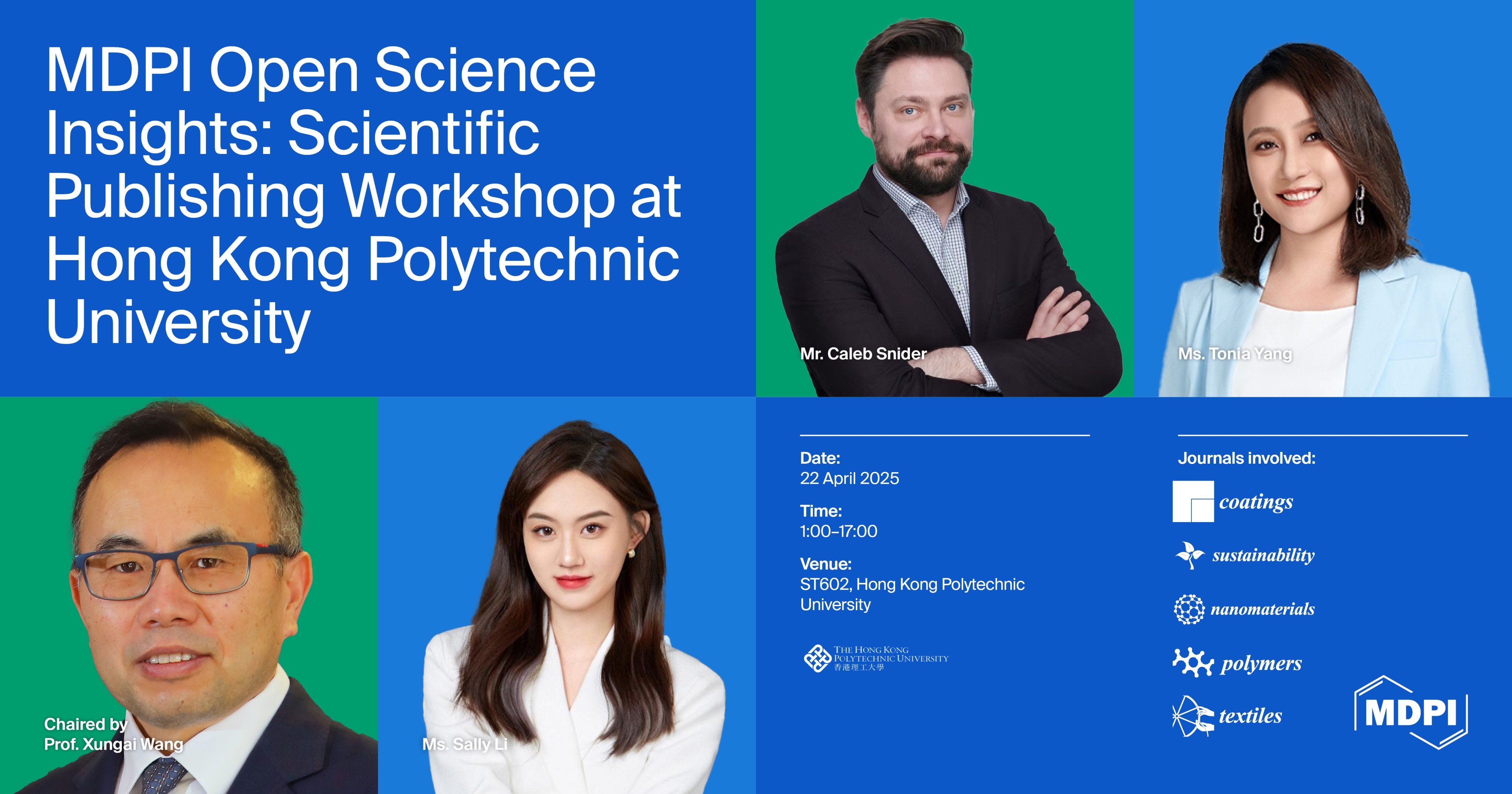
In collaboration with the Hong Kong Polytechnic University, Sustainability (ISSN: 2071-1050) and Coatings (ISSN: 2079-6412) are hosting a Scientific Publishing Workshop designed to educate attendees on the paper publication process and the ecosystem surrounding open access publishing. This session will cover a comprehensive introduction to the editorial process, providing valuable insights and instilling essential skills for structuring papers and replying to reviewers effectively. Additionally, participants will be instructed on methods to improve their scientific writing, with experts in the field leading the session to ensure a thorough understanding of how to escalate their publishing potential.
Date: 22 April 2025
Time: 13:00–17:00
Venue: ST602, Hong Kong Polytechnic University
Registration: https://www.surveymonkey.com/r/CF2VSH6
Schedule:
| Speaker | Program | Time |
| Prof. Xungai Wang (Chair) | Opening Ceremony | 15:00–15:10 |
| Ms. Sally Li | Open Access Insights and MDPI Introduction | 15:10–15:45 |
| Mr. Caleb Snider | How to Write and Structure a Journal Article | 15:45–16:20 |
| Ms. Tonia Yang | How to Respond to Peer Reviewers’ Comments | 16:20–16:55 |
| Closing Ceremony | 16:55–17:00 |
Profile:
 |
Prof. Xungai Wang (Chair) |
Prof. Wang is Chair Professor of Fiber Science and Technology and a Global STEM Scholar at the Hong Kong Polytechnic University. He also serves as the Editor-in-Chief of the Journal of the Textile Institute. |
 |
Ms. Sally Li |
Ms. Sally (Sijia) Li graduated from the University of Sydney and joined MDPI in 2019. Previously served as Assistant Editor for Sustainability and Managing Editor for Urban Science, JTAER, and Hardware. Currently working as the Journal Development Editor for Sustainability and Head of Marketing Events. Based in MDPI’s Hong Kong office, responsible for market expansion and scholar services in the Greater Bay Area. She is committed to providing researchers with efficient and professional publishing support. |
 |
Mr. Caleb Snider |
Mr. Caleb Snider holds a Master’s degree in the Study of Religion from the University of Toronto, another Master’s degree in English Literature from the University of Ottawa, and a post-graduate certificate in publishing from Humber College, Toronto. He joined MDPI in 2017 as an English Editor, and in 2020 was chosen to help found MDPI’s first North American office in Toronto, Canada as Deputy Operations Manager. In April 2022, he was promoted to Operations Manager of the Toronto office and oversaw the strategic planning and implementation of operational initiatives across the United States and Canada. In 2024, he was promoted to Public Affairs and Strategic Partnership Manager, engaging directly with both high-level institutional and government stakeholders in the Asia Pacific and individual scholars on a grassroots level in the Asia Pacific region. |
 |
Ms. Tonia Yang |
Ms. Tonia Yang graduated from The Chinese University of Hong Kong. Currently, she serves as Chief Section Managing Editor of Coatings journal and the Deputy Section Leader (overseas) of MDPI Section “Materials Sciences”. Her main responsibilities include the operation of international cooperation projects for the Section “Materials Sciences” and the management of overseas employees in Romania, Poland, Serbia, Spain, the UK, and other regions. Deeply committed to facilitating a productive exchange between editorial teams and scholars, Ms. Yang endeavors to offer customized, top-notch publishing services to enhance the journal’s standing within the international academic community. |
2 April 2025
MDPI INSIGHTS: The CEO's Letter #21 - Annual Report, Swiss Consortium, IWD, ICARS, Serbia

Welcome to the MDPI Insights: The CEO's Letter.
In these monthly letters, I will showcase two key aspects of our work at MDPI: our commitment to empowering researchers and our determination to facilitating open scientific exchange.
Opening Thoughts

MDPI Releases 2024 Annual Achievements Report
I’m pleased to share the release of MDPI’s 2024 Annual Achievements Report, which reflects our commitment to efficiency, transparency, and excellence in scholarly communication. The report showcases key themes related to our growth (highlighting our workforce expansion, new offices, journal milestones), excellence (editorial and publishing advancements), people (talent development and training), and community (partnerships, conferences, and outreach).
MDPI continues to build connections and drive scientific progress
Our mission remains clear: to support researchers worldwide by delivering an efficient, high-quality publishing experience while strengthening the global Open Access (OA) movement.
Advancing Open Access: A Global Knowledge Hub
In 2024, we published 238,000 peer-reviewed OA articles, reaching over 25 million downloads. This reinforces MDPI’s role as a global knowledge hub, breaking down barriers to access and ensuring that high-quality research is freely available to everyone. As part of the OA movement, we are actively democratizing knowledge, making scientific advancements accessible to researchers, policymakers, educators, and the public, without the restrictions of traditional paywalls.
Expanding our Workforce and Strengthening Research Integrity
Our global presence grew in 2024 with the opening of a new Seoul office, and our workforce expanded to 6,650 staff across 21 offices. This reflects our continued growth mindset and investment in global accessibility. We also continued to take a proactive stance on our commitment to research integrity, tripling our team in this area and joining STM’s Integrity Hub and United2Act. This means more rigorous quality control, stronger safeguards, and collaboration with global initiatives to detect and combat unethical publishing practices at an industry level. Our growth is about reinforcing our role as a trusted, ethical, and accessible publishing platform for researchers worldwide.
Growing Partnerships and Impact in Scholarly Communication
MDPI’s partnerships continue to thrive, with over 900 institutional collaborations, including a landmark agreement with ZB MED in Germany, covering more than 100 universities. Additionally, more than 90% of evaluated MDPI journals have been accepted into Web of Science, including 60 new acceptances in 2024, with nearly 300 journals expected to receive a Journal Impact Factor in 2025. In the same period, 37 MDPI journals were accepted into Scopus, bringing our total indexed titles to 306. Most importantly, 95% of authors rate their experience with MDPI as excellent or good – an achievement that underscores our dedication to serving the research community.
I encourage you to read through our Annual Report, which highlights these milestones and our vision for the future. Thank you for being part of MDPI’s journey in advancing open science.
Impactful Research

MDPI Renews Partnership with CSAL to Support Swiss Universities
I am pleased to announce the renewal of our partnership with the Consortium of Swiss Academic Libraries (CSAL) for 2025. This extension reinforces MDPI's dedication to advancing open science through transparency, efficiency, and collaboration.
Our renewed agreement with CSAL strengthens support for Swiss universities, ensuring that gold open access publishing remains both accessible and affordable for researchers across Switzerland. Among the institutions participating in this agreement are ETH Zurich and EPFL Lausanne, along with 20 other leading institutions, further expanding the reach and impact of our collaborative efforts.
To date, over 3.9 million researchers have published their findings in MDPI journals, a testament to our role in enhancing Switzerland's position as a hub for university education and research.
Inside MDPI

Celebrating International Women's Day: Accelerating Action
In honour of International Women's Day, MDPI embraced the theme “Accelerate Action,” a global call to advance women's progress by implementing effective strategies and resources. As part of our commitment, we highlighted how open access publishing empowers female voices in research and academia.
Throughout March, we featured original blogs authored by MDPI’s female contributors, showcasing the successes of our journals and employees, and addressing pressing topics such as women's health.
“Open Access supports women in education”
Women Accelerating Action Outside of MDPI

MDPI employee Ana Zdravkovic is accelerating action outside of her MDPI role as a Production Assistant. Working with like-minded women at the award-winning Belgrade-based organization UZOR OsnaŽene (meaning ‘empowered women’), they identify serious flaws in cybersecurity, and help protect women and children against online predators by providing evidence to improve legislation and laws around cyber-attacks.
In this article, we interview Ana, celebrating the important and inspiring work that she and the organisation do.
How Open Access Supports Women in Education

Every day, women and girls face barriers in education or career progression. This is caused by a range of factors, including social expectations, poverty, and poor infrastructure.
Quality opportunities and participation in the education system by women is essential to achieving equality and fulfilling their human rights.
Here, we examine how Open Access supports women in education by removing barriers and ensuring that vital research is accessible.
Recent Advancements in Research on Endometriosis

March is Endometriosis Action Month. Endometriosis is a medical condition affecting women and young girls of reproductive age, often causing symptoms such as severe pelvic pain, irregular periods, and infertility.
More research on endometriosis is still urgently needed.
This research will help develop efficient diagnoses and better treatment for those struggling with the condition.
In this article, we explore what endometriosis is and discuss the latest research advancements on the disease.
We also curated a selection of MDPI journals, articles, and Special Issues focusing on gender equity, women in the workplace, and women’s health. Find out more about these by visiting our IWD – Accelerate Action landing page.
As I reflect on the month of March and International Women’s Day, I would like to take a moment to recognize and thank all of the incredible women at MDPI for your dedication to democratizing knowledge and shaping open access. Your contributions are invaluable, and they continue to shape the future of MDPI.
Coming Together for Science

The International Conference on Advanced Remote Sensing (ICARS 2025)
The International Conference on Advanced Remote Sensing (ICARS 2025) took place from 26–28 March 2025, in Barcelona, Spain. It was chaired by Prof. Dr. Fabio Tosti from the Faringdon Research Centre for Non-Destructive Testing and Remote Sensing (UK), Prof. Dr. Andrea Benedetto from University Roma Tre (Italy), and Prof. Dr. Luis Ángel Ruiz from Universitat Politècnica de València (UPV, Spain).
Over three days, the conference explored innovations in Earth and environmental sciences, engineering advancements, and practical applications in biological and agricultural fields.


I am pleased to share that the 1st edition of ICARS 2025 was a great success, with 133 attendees out of 146 registrations. The event featured 43 short talks, 64 posters, and 103 accepted abstracts, along with nine keynote speakers and a major panel with five expert panellists.
Over 60 attendees joined the conference dinner, and the event received outstanding feedback.
The main goal of ICARS2025 was to cover how advanced remote sensing technologies are transforming our approach to global challenges.

Awards
Four awards were presented at the conclusion of the conference, sponsored by the journal Remote Sensing: Best Poster Award (€400), Best Oral Presentation Award (€400), and two Early Career Researcher Awards (1st prize: €600 and 2nd prize: €200).
Thank you to our Partnering Societies
We are grateful for the support of our four partnering societies and nine media partners, who played an important role in promoting the conference. Special thanks to our partnering societies: the European Federation of Geologists (EFG), Geoscience Energy Society of Great Britain (GESGB), Asociación Española de Teledetección (AET) – the Spanish Association of Remote Sensing, and the International Society for Digital Earth (ISDE).
Upcoming In-Person Event

31 March–2 April 2025
Plants 2025: From Seeds to Food Security
Location: Barcelona, Spain
This event will gather plant scientists to discuss the latest research on how to feed a growing population while maintaining a sustainable agro-ecosystem.
Find more upcoming MDPI events here.
Closing Thoughts

MDPI Serbia Salon 2025: A Gathering of Academic Excellence
On Tuesday, 18 March, we successfully concluded our first MDPI Serbia Salon in Belgrade. This event provided a great opportunity to showcase MDPI’s achievements, strengthen connections with the Serbian academic community, and highlight our role as the largest publisher in Serbia. We were honoured to welcome Prof. Dr. Sergej M. Ostojić, Editor-in-Chief of MDPI journal Clinical Bioenergetics, as a guest speaker.

Over the past five years, MDPI has experienced continuous growth in Serbia, with an increasing number of publications, an expansion of Editorial Board memberships, and a greater number of active peer reviewers. The Salon allowed us to express our thanks to the Serbian research community while gathering feedback from attendees representing several major universities.
Discussion topics

As part of the event, I delivered an opening speech highlighting MDPI’s achievements and direction.
The event featured presentations from MDPI colleagues, including discussions on open science, publishing ethics, and our achievements in Serbia.
A special thank-you to all our MDPI presenters, panellists, and organizers who made his event a success. I hope the MDPI Serbia Salon becomes a tradition for years to come, creating connections within the Serbian research community.
Visit to the Science Fund of Serbia and The Ministry of Science
During my visit to Belgrade, I had the opportunity to join my colleagues Emir Ramadani (Operations Manager) and Nevena Blagojev (Journal Relations Manager) in meetings with the Science Fund of Serbia and the Ministry of Science, where we received strong support for our work in Serbia.
Both organizations highly value our presence in and commitment to Serbia, where we employ over 640 staff across our two offices in Belgrade and Novi Sad. We take great pride in creating job opportunities and supporting the community in Serbia.

“There’s a lot of exciting activity happening in MDPI Serbia”
Speaking with our Serbian Colleagues

Finally, I had the opportunity to speak with our Serbian colleagues about our initiatives to expand and to improve our marketing & communication and public relations activities.
It was great to have an open discussion with colleagues – both in person and with the hundreds who joined online.
This visit to Belgrade had been a long time coming for me. Serbia is our largest operation in Europe and there’s a lot of exciting activity happening in MDPI Serbia, including the launch of a new office floor in Novi Sad and the growth and expansion of our teams.
I look forward to returning soon and continuing to support our colleagues across our Serbian offices.
Chief Executive Officer
MDPI AG








